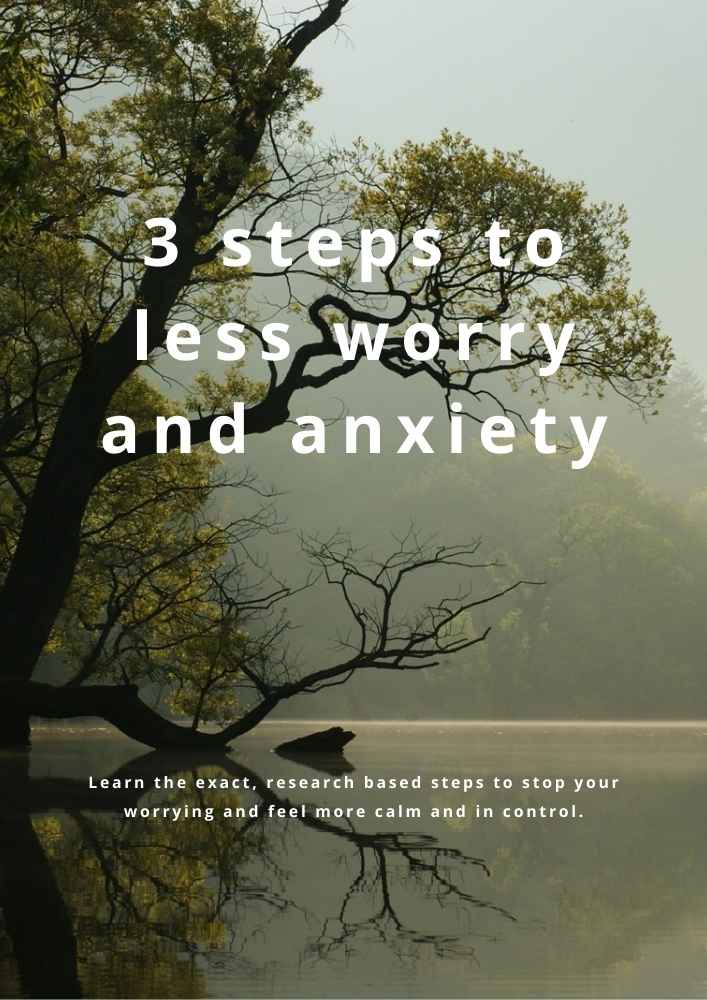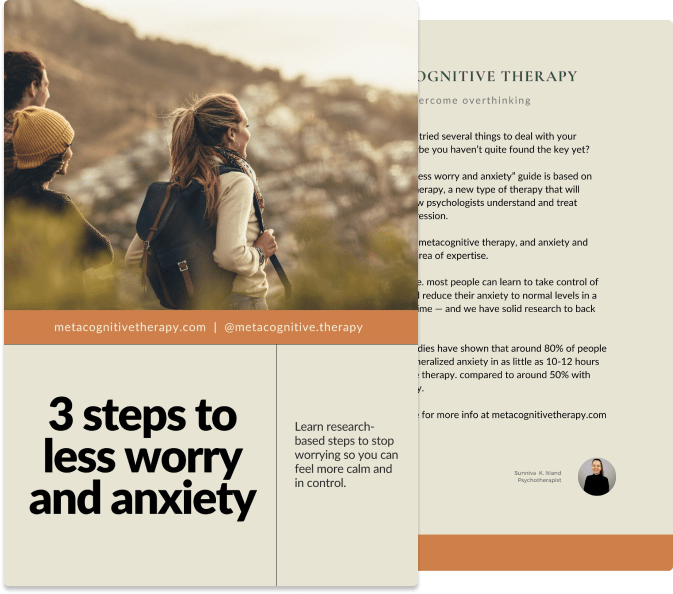Are you always worrying about your health? Overcome health anxiety with MCT

Download our best tips on reducing anxiety and worrying
Learn three powerful metacognitive therapy steps to stop the worry cycle, reduce anxiety, and feel calmer in everyday life.
.jpeg)
.jpeg)
If you find yourself worrying excessively about your health, constantly monitoring for signs of illness, you might be experiencing health anxiety.
Health anxiety is a condition where people become fixated on their health and spend much of their waking hours scanning for any signs of health issues, and worrying about any irregularities in their bodies. And when you spend that much time worrying that you might be ill, those anxieties start to take over your life.
Traditional therapy approaches typically focus on challenging and changing thoughts related to illness—asking questions like, 'How likely is it that this symptom is a sign of ALS?' or 'Is your belief rational?' Metacognitive Therapy (MCT) takes a totally new perspective, showing those suffering from health anxiety that the real issue is not the thoughts themselves, but rather the persistent worrying and coping strategies they use to manage those thoughts.
The problem isn’t your anxious thoughts, it’s your response to them
Everyone experiences fleeting thoughts about illness or notices physical symptoms from time to time — that’s completely normal. But not everyone gets stuck in a cycle of worry. Through MCT, people can discover that health anxiety is driven by the time and energy spent engaging with illness-related thoughts, rather than the thoughts themselves.
Take heart attack patients, for example: They’re statistically at a heightened risk of experiencing another one. But will it help them to worry constantly about the possibility of another heart attack? Can they make healthy choices and follow their medical plan without spending most of their time ruminating on their condition? MCT encourages people to shift their mindset from needing to 'solve' these thoughts to recognizing that excessive symptom-monitoring, rumination, and reassurance-seeking are the real problems.
Are you using these strategies that maintain health anxiety?
People with health anxiety may use various coping strategies that unintentionally reinforce their worries:
- Body checking: Constantly scanning for symptoms, often from the moment they wake up.
- Worrying: Repeatedly questioning, “What could this symptom be? Could it be cancer? Could it be something serious?”
- Reassurance-seeking: Regularly consulting Google for every sign and symptom, or turning to loved ones, for confirmation that they are not ill.
- Excessive medical visits: Using doctor visits as a way to control worry, rather than booking them for legitimate health concerns.
- Avoidance: Staying away from news about illnesses or avoiding medical care altogether, because it feels too triggering.
- Thought suppression: Trying to push away any health-related thoughts or ignoring anything that triggers health anxiety.
These strategies create a paradox: the more you worry and monitor symptoms, the more anxiety-driven symptoms emerge—often mimicking those of real illnesses. This reinforces the belief that something is truly wrong, creating a vicious cycle of fear and checking.

Download our best tips on reducing anxiety and worrying
Learn three powerful metacognitive therapy steps to stop the worry cycle, reduce anxiety, and feel calmer in everyday life.
Understanding the cycle of reassurance
When people with health anxiety seek medical reassurance for concerns that are rooted in anxiety, they often feel immense relief when their doctor confirms that nothing is wrong. But this relief is usually short-lived. They’ll soon notice new symptoms, or doubts will creep in: “What if the doctor missed something? What if they weren’t a specialist in this particular illness?” The cycle starts all over again, reinforcing the belief that the only way to control worry is through constant checking and reassurance-seeking. You can read more about how our beliefs and behaviours can prolong mental distress, through a process called the Cognitive Attentional Syndrome (CAS), here.
What drives health anxiety in the first place?
Your metacognitive beliefs direct how you respond to negative thoughts, and MCT can help you identify the beliefs that are sustaining your health anxiety. These beliefs can sound like:
- 'I have to monitor for symptoms, so I don't miss something important.'
- “If I don’t research every symptom, how will I keep myself safe and healthy?”
- “Worrying about my symptoms helps me stay prepared”
- 'Thinking negatively about my health can cause illness.'
- 'If I think I’m healthy, I might be tempting fate.'
- 'Worrying about my health is uncontrollable.'
These beliefs make it feel impossible to escape health anxiety: If you ignore any symptoms, what if you miss a serious illness? If you focus on your health, could those fear thoughts make you sick? This creates a no-win situation that heightens the physical and mental impacts of anxiety.
Breaking the cycle with Metacognitive Therapy
Metacognitive therapy can help you spend less time and energy on negative thoughts about your health by challenging the underlying metacognitive beliefs that drive anxiety.
Key elements include:
- Detached Mindfulness: Allowing thoughts to come and go without responding to them or attempting to control them.
- Reducing symptom-monitoring and reassurance-seeking: Decreasing constant checking, Googling of symptoms, and cutting out doctor visits that are driven by anxiety rather than necessity.
- Exposure to health-related thoughts: Instead of avoiding thoughts about illness, learning to observe them without engaging with them.
- Scheduling health checks rationally: Following recommended health guidelines and routine screenings, rather than using doctor visits as a coping mechanism for anxiety.
But what if I have an actual illness?
MCT leads people to question if it’s at all helpful to consistently worry about illness, whether you have an official diagnosis, or simply worry anytime a symptom pops up. Either way, the approach is the same: symptom-monitoring and worrying doesn't make illness easier to handle, and it doesn't prevent disease. If something seems significantly wrong with your health, you can go see a doctor without ruminating about it. If you're dealing with a health condition or diagnosis, it's absolutely important to care for your health and follow medical advice, but constantly stressing about your health can make you more anxious, exacerbate your symptoms, and even result in avoiding seeing the doctor if you use avoidance to manage your anxiety.
Finding peace of mind
There’s a key perspective shift that can help those with health anxiety regain control: the issue isn’t whether you’ll become ill—everyone experiences health issues at some point. The real cause of suffering here is the excessive time and mental effort spent worrying about potential health issues. Rather than trying to eliminate thoughts about illness, MCT helps people learn how to let them come and go without getting stuck in a cycle of worry and reassurance seeking.
Of course, it’s important to take care of your physical health, but you can do that without ruminating on the state of your health. By reducing your engagement with illness-related thoughts and challenging problematic metabeliefs (for example, believing that negative thoughts can make you ill, or that if you don't think about your health, you'll get sick), you will find that anxiety naturally lessens, and you can focus on living a fuller, less fear-driven life.
If you’re looking for more support in dealing with anxiety, check out these seven tips to stop worrying!



